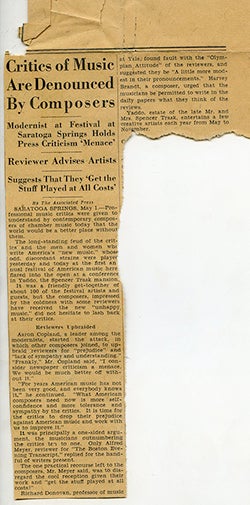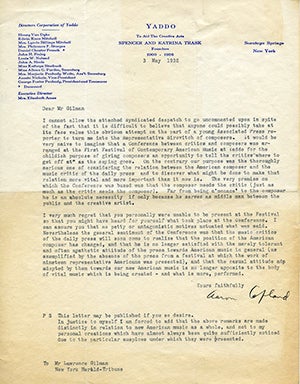April 5, 2019
Aaron Copland (1900-1990) was a major American musical composer in the twentieth century. During his long career, Copland produced a wide array of compositions, including ballets, choral music, film scores, operas, and orchestral music. The Lawrence Gilman papers contain a remarkable letter from Copland to Lawrence Gilman (1878-1939), an important music critic for the New York Herald-Tribune. In it Copland pondered the relationship between musical composers and their critics.
The letter, dated May 3, 1932 was mailed from the First Festival of Contemporary American Music at Yaddo in Saratoga Springs. Copland began the letter by  referring to a newspaper clipping (see right, click image to enlarge) reporting on the festival. The author of the clipping suggested that there was a “long-standing feud” between composers and critics. The article printed a quote from Copland: “I consider newspaper criticism to be a menace. We would be much better off without it.”
referring to a newspaper clipping (see right, click image to enlarge) reporting on the festival. The author of the clipping suggested that there was a “long-standing feud” between composers and critics. The article printed a quote from Copland: “I consider newspaper criticism to be a menace. We would be much better off without it.”
Writing to Gilman, Copland said that the clipping in question “cannot go uncommented upon.” He wrote that the purpose of the conference was not to attack critics but to make the composer/critic interaction “more vital and more important,” and that “the composer needs the critic (just as much as the critic needs the composer).” Copland lamented the fact that Gilman did not attend the event. He argued that modern American composers now seek more positive reviews from their critics. In the postscript, Copland granted Gilman permission to publish this letter. The composer also stated that his own works had generally been praised by critics.
Lawrence Gilman contributed to American musical criticism in many ways. He worked as a music critic for Harper’s Weekly from 1901 to 1913, the North American Review from 1915 to 1923, and the New-York Herald Tribune from 1923 until his death in 1939. He also annotated program notes for the New York Philharmonic Symphony Orchestra and the Philadelphia Orchestra.
American music was changing in the 1930s, as musicians adapted to new forms of technology such as film and radio. In addition to composing musical works, Copland was an author of articles and books on music. As this letter to a noteworthy music critic indicates, Aaron Copland sought to improve the relationship between composers and their critics.
--Scott S. Taylor, Manuscripts Archivist

